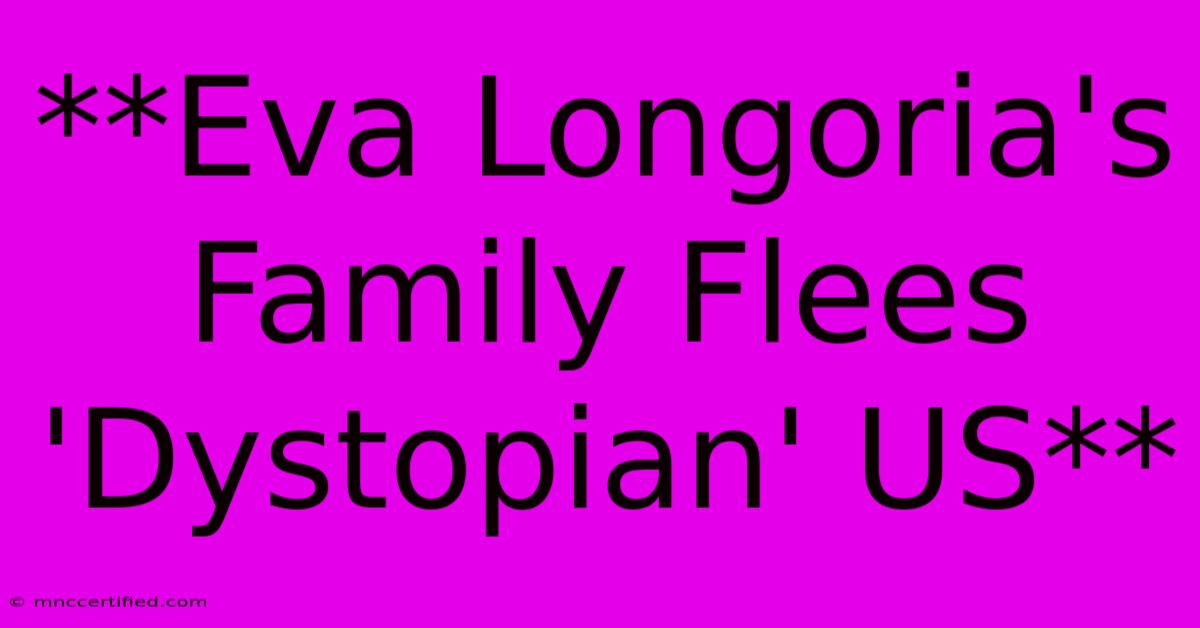**Eva Longoria's Family Flees 'Dystopian' US**

Table of Contents
Eva Longoria's Family Flees 'Dystopian' US: A Deeper Look at the Actress's Comments
Eva Longoria, the acclaimed actress and producer, recently made headlines with comments hinting at her family's consideration of leaving the United States, describing the current political climate as "dystopian." This statement sparked considerable debate and warrants a closer examination of the context, implications, and potential impact on the ongoing conversation surrounding immigration and political polarization in the US.
Understanding Longoria's Concerns: More Than Just Politics
While Longoria didn't explicitly detail the reasons behind her family's contemplation of emigration, the "dystopian" label clearly points towards deep-seated anxieties about the current socio-political landscape. This isn't solely about partisan politics; it encompasses a broader range of concerns that resonate with many Americans, including:
- Access to Healthcare: The ongoing debate surrounding healthcare access and affordability is a major concern for many families. The high cost of healthcare in the US, coupled with anxieties about pre-existing conditions, could significantly influence a family's decision to relocate.
- Gun Violence: The pervasive issue of gun violence in the US is another critical factor. Mass shootings and the easy availability of firearms contribute to a climate of fear and insecurity, prompting families to seek safer environments for their children.
- Climate Change: The increasingly visible effects of climate change, including extreme weather events and environmental degradation, are a growing concern for many. The potential for displacement due to natural disasters or environmental damage could also push families to consider leaving.
- Political Polarization: The deep partisan divide and the increasing level of political rhetoric can contribute to a sense of instability and uncertainty, making families question the future of the country.
- Education System: Concerns regarding the quality and accessibility of education, including rising tuition costs and debates surrounding curriculum, also play a crucial role in families' decision-making processes.
The Impact of Celebrity Voices
Longoria's public statements carry significant weight. As a prominent Latina actress and advocate, her voice amplifies the anxieties felt by many within her community and beyond. Her comments serve as a powerful reminder of the real-life consequences of political decisions and social issues. This isn't simply a celebrity expressing a personal opinion; it's a reflection of the concerns of a large segment of the population.
The Broader Context: Immigration and the American Dream
Longoria's potential move, however hypothetical, underscores the ongoing debate surrounding immigration and the evolving definition of the "American Dream." For many, the pursuit of a better life in the US has traditionally involved overcoming challenges and building a future for their families. However, the current social and political climate is causing some to question whether this dream remains attainable.
Examining the "Dystopian" Label
The use of the term "dystopian" is certainly impactful and evokes a sense of alarm. It suggests a society characterized by oppression, social unrest, and a bleak future. While some might criticize the strong language, it's clear that Longoria’s statement aims to highlight the severity of the issues she and many others are facing.
What's Next? A Call to Action?
Longoria's comments should not be dismissed as mere celebrity gossip. They represent a critical moment in the ongoing conversation about the future of the United States and the challenges facing families across the country. Her statement serves as a potential call to action, encouraging a more thoughtful and compassionate approach to addressing the complex issues that are driving people to contemplate leaving the country.
Further Discussion Points:
- How are these issues impacting different communities disproportionately?
- What policies could be implemented to alleviate these concerns?
- How can we foster a more inclusive and equitable society?
This situation highlights the urgent need for dialogue and policy changes to ensure a more hopeful and inclusive future for all Americans. The "American Dream" needs to remain a reality, not just a fading aspiration.

Thank you for visiting our website wich cover about **Eva Longoria's Family Flees 'Dystopian' US**. We hope the information provided has been useful to you. Feel free to contact us if you have any questions or need further assistance. See you next time and dont miss to bookmark.
Featured Posts
-
Tate Mc Raes So Close To What Album Global Release
Nov 15, 2024
-
November Sky Supermoon And More Nov 15 22
Nov 15, 2024
-
Spadaros 26 18 Win Analysis And Takeaways
Nov 15, 2024
-
Live Updates Greece Vs England Result And Reaction
Nov 15, 2024
-
Aquablation Cost Without Insurance
Nov 15, 2024